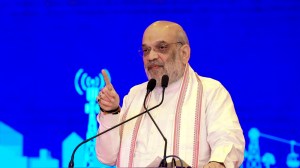Behind US supply lines are Indians in Kuwait
India may disapprove of the US war on Iraq but enterprising expatriates here know an opportunity when they see it. Kuwait’s position as...

India may disapprove of the US war on Iraq but enterprising expatriates here know an opportunity when they see it. Kuwait’s position as the launching platform for the US-led invasion has made Indian businessmen and suppliers an integral part of the US army’s massive logistical operations.
The strength of the coalition forces in Kuwait is approximately 270,000. The daily requirements for this huge force — from biscuits, chips and MREs (meals ready to eat) to concrete bunkers, empty sacks, mobile toilets, tyres, 4×4 jeeps and buses — are of enormous proportions. And the Indian businessmen are supplying a large number of these items.
Kuldeep Lamba, Managing Partner of Al Mailem Group of Industries, says ‘‘Indians are preferred because the Americans know we can deliver.’’ Lamba says they have landed huge orders. ‘‘Sometimes there are items which are not in our stock or beyond our capacity to supply there and then, but we never say no. We tell them we will get it,’’ he says. He is supplying jerry cans, tyres, plywood and auto parts to the forces.
Dhiraj Oberoi, who is a managing partner in Kuwait Indo Trading Company, says that ‘‘initially the demand was just a trickle but soon enough it swelled so much that it was difficult to meet.’’ Oberoi, however, hastens to add that ‘‘we managed to meet the demand. We have been supplying them with bread, croissants, chips, biscuits, snacks, sandwiches, canned food and bottled water.’’
In Kuwait, the law prohibits non-Kuwaitis from running a fully-owned business. All businesses are either owned by the Kuwaitis or are a partnership with Kuwaitis holding the majority stake. They are happy to let the Indians run their business. For instance, both Oberoi and Lamba have Kuwaiti partners who hold 51 per cent stake in their companies but they hardly do any work or even attend office. They trust their Indian partners. ‘‘Indians play a central role in Kuwait’s economy,’’ says Oberoi. The only worry now is the congestion at Kuwait’s ports. ‘‘The concern is that raw materials are not reaching here in time. There are two major ports in Kuwait. One is completely under US army control and other is functional. But there is a huge backlog and that is delaying deliveries,’’ says Oberoi. Lamba points out that the ‘‘suppliers are scared to send goods because the rates of insurance have hit the ceiling.’’
Demand will spiral once more when relief agencies set up their camps in Iraq. ‘‘The influx of refugees or internally displaced persons will require additional supplies and we are making plans to meet that demand,’’ says Oberoi. Others, like Lamba, are eyeing post-war Iraq. ‘‘We are expecting to generate good business in post-war Iraq. Before Iraq’s invasion of Kuwait in 1990, we had excellent business links in that country and we had prepared plans to quickly set up operations whenever it was feasible during the post-war period,’’ he says. Oberoi, who is also Chairman of Kuwait India Business Council, says that Indian businessmen will be looking for opportunities to set up new manufacturing units in post-war Iraq. ‘‘It’s going to be big business, boom time for Indians will come very soon,’’ he says. According to him, investors will be looking at consumer goods and construction and engineering projects.
(Watch Worldview India on DD National at 10:30 pm tonight at the end of the war report.)
Photos





- 01
- 02
- 03
- 04
- 05


























